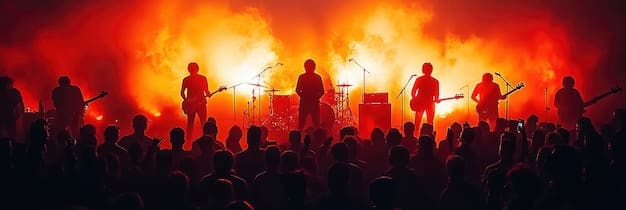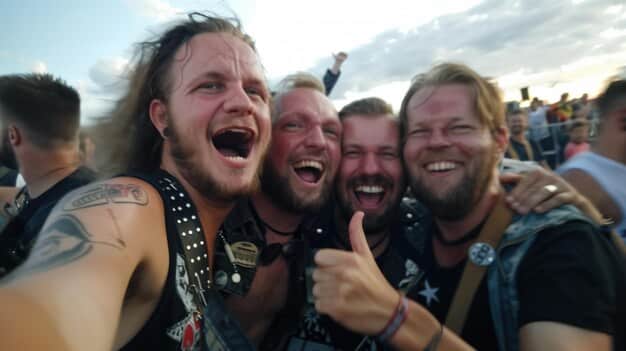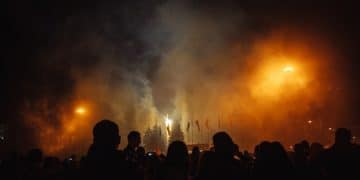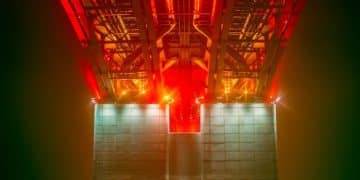The Psychology of Heavy Metal Concerts: Thrills and Community

The Psychology of Heavy Metal Concerts: Understanding the Thrill of Live Music explores the unique emotional and social experiences that drive fans to these high-energy events, highlighting the sense of community, catharsis, and identity formation found within the heavy metal scene.
The raw energy, the thunderous sound, the sea of headbangers – a heavy metal concert is an experience unlike any other. But what exactly is it about these events that draws millions of fans worldwide? The Psychology of Heavy Metal Concerts: Understanding the Thrill of Live Music delves into the fascinating reasons behind the allure.
The Sensory Overload and Its Appeal
Heavy metal concerts are renowned for their intense sensory experiences. From the ear-splitting volume to the flashing lights and the vibrant crowd, these events offer a unique assault on the senses. This overload, however, is not necessarily negative. Many fans actively seek out and enjoy this sensory bombardment.
The Science of Sound and Excitement
The sheer volume of a heavy metal concert triggers a physiological response. The loud music releases adrenaline, creating a heightened state of alertness and excitement. This surge of adrenaline can be addictive, driving fans to return to concerts repeatedly.
Visual Spectacle and Immersion
Beyond the music, the visual aspects of a heavy metal concert contribute significantly to the overall experience. Elaborate stage designs, pyrotechnics, and dynamic lighting create a sense of spectacle that captivates the audience. This visual immersion enhances the emotional impact of the music.
- Adrenaline Rush: Loud music and energetic performances trigger the release of adrenaline.
- Sensory Immersion: A combination of sound, light, and visual effects creates an all-encompassing experience.
- Heightened Emotions: The intense sensory input amplifies emotional responses to the music.
The appeal of sensory overload in heavy metal concerts lies in its ability to provide a temporary escape from everyday life. Fans willingly subject themselves to the intensity, finding a sense of liberation and excitement in the shared experience.
The Power of Collective Identity
Heavy metal concerts serve as a gathering place for individuals who share a common passion. These events foster a strong sense of community and belonging, allowing fans to connect with others who understand and appreciate their musical tastes.

Finding Your Tribe
For many fans, heavy metal is more than just music; it’s a lifestyle. Concerts provide an opportunity to express this identity and connect with like-minded individuals. The shared experience of moshing, singing along, and celebrating the music creates a powerful bond among attendees.
Breaking Down Social Barriers
Within the heavy metal community, social barriers often dissolve. People from diverse backgrounds come together to celebrate their love of music, creating a welcoming and inclusive environment. This sense of unity is a major draw for many fans.
- Shared Passion: Concerts bring together individuals who share a deep love for heavy metal music.
- Sense of Belonging: Fans find a community where they feel accepted and understood.
- Breaking Down Barriers: Social differences fade away as people unite over their shared musical tastes.
The collective identity formed at heavy metal concerts provides fans with a sense of belonging and validation. This feeling of community is a key component of the overall concert experience, drawing people back time and time again.
Catharsis and Emotional Release
Heavy metal music often deals with themes of anger, frustration, and pain. Attending a concert can provide a cathartic outlet for these emotions, allowing fans to release pent-up feelings in a safe and supportive environment.
Expressing Difficult Emotions
The aggressive and intense nature of heavy metal music can be a powerful tool for expressing difficult emotions. Concerts offer a space where fans can scream, shout, and let go of their frustrations without judgment.
The Healing Power of Music
Music has long been recognized for its therapeutic benefits. Attending a heavy metal concert can be a form of emotional release, allowing fans to process and overcome personal challenges. The shared experience of catharsis can be incredibly powerful.
- Emotional Outlet: Concerts provide a safe and acceptable way to express anger and frustration.
- Therapeutic Release: Music can help individuals process and release pent-up emotions.
- Shared Experience: The collective catharsis creates a sense of unity and support.
The cathartic release experienced at heavy metal concerts is a significant factor in their appeal. Fans find solace and healing in the music and the shared experience, making these events a powerful form of emotional expression.
The Role of Ritual and Tradition
Heavy metal concerts are often steeped in ritual and tradition. From the opening chords of a classic song to the synchronized headbanging of the crowd, these rituals create a sense of continuity and connection to the history of the genre.
The Importance of Familiarity
Many heavy metal fans have been attending concerts for years, even decades. The familiarity of the rituals and traditions provides a sense of comfort and nostalgia. These concerts become a recurring event, a touchstone in their lives.
Creating a Shared Narrative
The rituals of a heavy metal concert help to create a shared narrative among fans. They reinforce the values and beliefs of the community, strengthening the bonds between attendees. This sense of shared history is a powerful draw for many.
- Nostalgia and Comfort: Familiar rituals provide a sense of comfort and connection to the past.
- Shared Values: Traditions reinforce the values and beliefs of the heavy metal community.
- Strengthened Bonds: Rituals create a sense of shared history and connection among fans.
The ritualistic aspects of heavy metal concerts contribute to their enduring appeal. Fans find comfort and connection in these traditions, making concerts a meaningful and recurring part of their lives.
The Influence of Artist Persona and Performance
The persona and performance style of heavy metal artists play a crucial role in the overall concert experience. From the charismatic frontman to the skilled musicianship of the band, these elements contribute to the excitement and energy of the event.
The Power of Charisma
A charismatic frontman can captivate an audience, drawing them into the performance and creating a sense of connection. Their stage presence, vocal delivery, and interaction with the crowd can elevate the concert experience to new heights.
Musical Mastery and Innovation
The technical skill and musical innovation of the band are also essential. Impressive guitar solos, complex drum patterns, and powerful vocal performances showcase the musicianship of the artists and inspire awe in the audience.
The persona and performance style of heavy metal artists are carefully crafted to create a specific atmosphere and evoke certain emotions. These elements are integral to the overall concert experience, contributing to the thrill and excitement of the event.
The Economic and Social Factors
Several economic and social factors also contribute to the enduring popularity of heavy metal concerts. These events provide a form of entertainment that is often more accessible and affordable than other live performances.
- Accessibility: Heavy metal concerts are often held in smaller venues, making them more accessible to a wider audience.
- Affordability: Ticket prices for heavy metal concerts are often lower than those for other genres, making them a more affordable form of entertainment.
- Social Connection: Concerts provide an opportunity for fans to socialize and connect with others who share their interests.
The economic and social factors surrounding heavy metal concerts contribute to their widespread appeal. These events provide an accessible, affordable, and social form of entertainment for fans around the world.
| Key Element | Brief Description |
|---|---|
| 🤘 Sensory Overload | Intense sounds and visuals heighten excitement. |
| 🤝 Community | Fans connect with like-minded individuals. |
| 🔥 Catharsis | Music provides a safe outlet for emotions. |
| 🎸 Rituals | Traditions create connection to music history. |
Frequently Asked Questions
▼
The volume is a key part of the sensory experience, triggering adrenaline and heightening emotions. It’s a deliberate choice to create an intense atmosphere.
▼
Moshing is a physical release of energy and a way to connect with others in the crowd. It’s a form of catharsis and shared experience.
▼
Shared passion for the music and the experience of attending together fosters strong bonds. It creates a sense of belonging and mutual understanding.
▼
While intense, most venues have security measures in place. It’s important to be aware of your surroundings and respect others in the crowd to ensure a safe experience.
▼
The “metal horns” are a symbol of solidarity and appreciation for the music. It’s a way to show your enthusiasm and connect with the band and other fans.
Conclusion
Heavy metal concerts offer a unique blend of sensory stimulation, community bonding, and emotional release. They are more than just musical performances; they are cultural events that provide fans with a sense of belonging, catharsis, and excitement.





